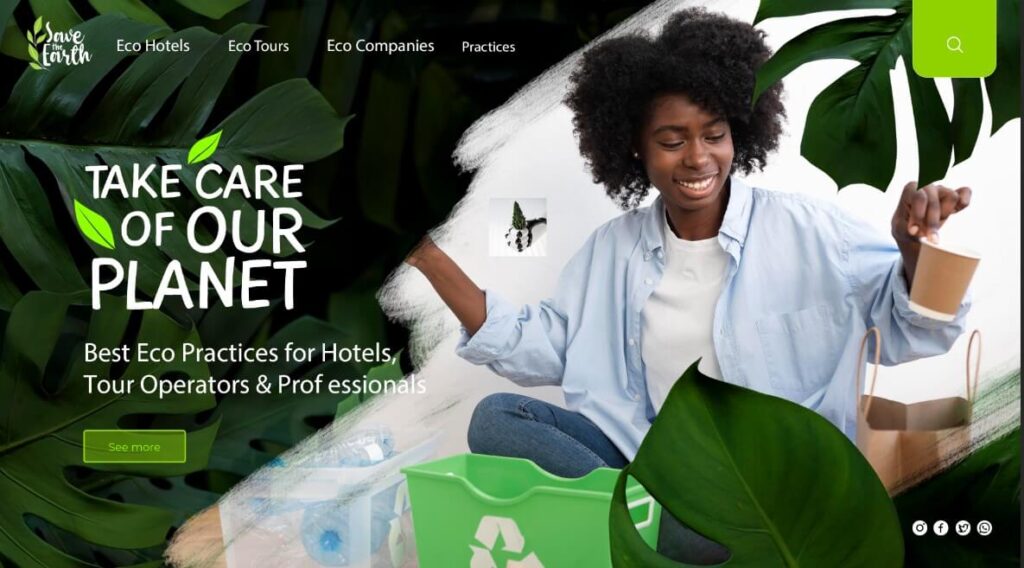Did you know that 40% of the current tourists are responsible tourists seeking sustainable travel experiences?
Further, 22% of visitors are seeking eco tourism practices that would make them leave an impact on their travel.
This makes them look out for eco tour companies that promote eco-friendly tourism practices.
Naicef is one of the best eco tour companies in Kenya. We seek to help you with the best eco-friendly practices for eco tourism for responsible travel.
To have the best conscious travelers, you need to incorporate the best eco-friendly hotel ideas if you are a hotelier.
Tour operators also need to incorporate eco practices in tour packaging for sustainable business.
Through our eco experiences with responsible travelers, Naicef tours have a sustainable program that enables visitors to join a sustainable tourism program for a sustainable tourism impact in Kenya.
A sustainable program that impacts local communities, the environment, and eco projects.
Hotels, tour companies, and tourism professionals need to give the best experiences not only to meet the desires of the tourist but also to promote the local community, environment, and economy sustainably for the future.
Imagine the next generation asking, ‘Why doesn’t this attraction look as beautiful as it once did from pictures?’
Let’s protect the future by implementing the best eco friendly practices in Kenya and across the world for eco tourism development.
You should know that when travellers choose responsible travel, they become responsible travellers who impact the future.
So, what are the major benefits of having the best eco tourism practice for hotels, tour companies, and tourism professionals?
Benefits Of Implementing Eco Tourism Practices
The benefits of implementing eco tourism practices in Kenya include;
1. Sustainable Impact
One major benefit of implementing eco tourism practices in Kenya is that you automatically impact all spheres of your business and the society at large in the long term.
You encourage visitors to be responsible, employees to be conscious, and partners to protect the future.
This UNTWO guide can help you measure Sustainable Tourism Impact.
2. Business Development
Eco tour companies, hotels with the best eco friendly ideas, and general tourism businesses that promote eco friendly practices for eco tourism receive better luxury travelers easily.
Eco-friendly tourism practices sell themselves through shared conservation values. They get conscious visitors that share such experience, hence saving you marketing sweat.
3. Community Development & Ownership
Eco tourism practices cannot be implemented without engaging the local communities.
This makes the local community earn a living and protects the value of assets in their community for the future.
A study on the role of promoting local community-based tourism by Festus (2019) concluded that local community engagement in tourism promotes ownership and protection for the future.
This improves their local destination and the community’s livelihood.
4. Local Economy Spending
The more eco-conscious tourists arrive in a destination, the more they spend money promoting eco practices that make the local economy thrive.
A study on spending patterns of tourists by Norma states that Eco tourists are higher spenders at the destination and are philanthropic than sustainable tourists.
5. Environmental Conservation
Responsible tourists promote conservation and influence better eco practices that conserve biodiversity and natural resources.
6. Long-Term Sustainability
Eco tour companies and hotels with the best eco friendly hotel ideas operate longer and better.
This is because they have sustainable and easy client and their operational cost are manageable through renewable energy, reuse, and recycling.
Ultimately, it helps them manage climate change challenges, and they are not hurt by severe business policies supporting sustainability.
Sustainable tourism in Kenya ensures businesses operate for the long term. Therefore, it can also keep pace with climate change trends!

Let’s see the best practices for eco tour companies, eco friendly hotel ideas, the benefits of eco tourism, and creative eco-friendly tourism practices.
Eco Tourism Practices For Eco Tour Companies
Tour operators should be on the front line to champion sustainable tourism.
Some of the eco tourism practices that eco-tour companies should adopt include;
1. Guest Education
Tour operators should encourage visitors to adopt eco-friendly practices through the booking process.
Tour operators should inform visitors about sustainable travel practices by showing them the best available options.
In particular, eco destinations in Kenya are fragile; thus, tour operators should adopt a ‘Leave No Trace’ principle through tourists as major partners.
2. Community Involvement & Engagement
Tour operators should involve the local communities in their operations.
This, in turn, promotes sustainable tourism because tourists can, with respect, interact with the local communities.
Additionally, supporting local community projects makes the community trust the tour operators for sustainable business relationships.
Therefore, this will ensure the tour operators are sustainable for the long term.
This makes them one of the eco tour companies that engage with local communities respectfully.
3. Reduce Carbon Emissions
This is one of the best eco-practices for responsible travel for tour operators.
Tour operators can reduce their footprint by using carbon offsetting to compensate for the excess emissions.
In terms of transportation, tour operators are urged to use sustainable transportation in their operations.
Additionally, electric vehicles (EVs) can be used during game drives as an eco-friendly practice for eco-tourism. Emboo River Camp has a full fleet of Electric Safari Land Cruisers powered by solar.
Also, creating shorter trips focused on hiking and cycling is a great way to implement responsible travel.
4. Partner with Eco-Certified Accommodations
Tour operators should consider partnering with certified eco-lodges in Kenya as one of the eco-tourism practices.
This creates credibility for the tour operators towards the eco tourists for eco stays and consumption.
In turn, travellers will recognise that tour operators choose the best eco-friendly accommodations for them.
Furthermore, partnerships are Sustainable Development Goals (SDGS), which are essential for any tour operator. Explore eco-rated accommodations by Ecotourism Kenya.
5. Cultural Sensitivity
The operators must educate their clients on how to interact with Kenyan local communities and cultures.
Respecting and appreciating culture is a sustainable practice of promoting cultural values and promoting community income.
This promotes sustainable tourism in Kenya in that there is respect for the culture, creating long-term relations.
6. Responsible Wildlife Viewing
The tour operators need to ensure tourists are well informed about respecting wildlife habitats by observing the safari code.
Therefore, well-laid-out rules need to be included and emphasised during the game drive. Tour operators and guides should lead in protecting wildlife ecosystems.
This act ensures responsible travel since tourists view wildlife without disturbing the habitat.
Such sustainable travel tips for tourism to Africa will greatly help tour companies promote eco tourism practices.

Best Eco Friendly Hotel Ideas
Hotels need to implement the best eco-friendly hotel ideas to attract the increasing number of eco tourists and be sustainable in their businesses. Some of the best eco friendly hotel ideas include;
1. Energy Efficient Strategy
Some of the best energy-efficient strategies for eco hotels include the use of LED lights, smart thermostats, solar power, and Energy Star appliances. These save operational costs, energy, and earn the hotel more.
Best eco hotels and eco lodges use the following eco-friendly hotel ideas;
a. LED Light: LED lights have been confirmed to save up to 60% of normal lighting bulbs. Use this practice to save energy and operational costs.
b. Smart thermostat: Smart thermostats help control energy usage during low occupancy. They also save power during inactive hours.
c. Solar panels: Solar panels use renewable energy that saves national power costs. Moreover, solar power helps you save energy and power bills.
d. Energy Star Appliances: Star-rated appliances such as fridges and freezers save you energy.
2. Water Conservation
One best ways to make a hotel water efficient is to recycle water, harvest water, use smart water taps, and save water. Below are eco friendly hotel ideas on water conservation management;
a. Greywater recycling: recycling kitchen water to be used in the washrooms and cleaning areas.
b. Linen reuse program: don’t always wash the least used linens, use them well, but be hygienic. Clean them when necessary.
c. Rainwater harvesting: harvest rainwater in reserve tanks and treat it to save you from buying water.
d. Low water flow fixtures: Manage water appropriately by using water-efficient taps. This will save you gallons.
e. Smart water taps: These include sensor taps and efficient taps that regulate water usage.
3. Sustainable Building Materials
a. Eco-friendly construction: eco friendly hotel construction means using local natural resources that don’t highly alter the natural environment.
b. Green roof: green roof means the hotel roof is fully solar installed or is environmentally conducive to reflect nature.
c. Natural insulation: ensure room designs are well done, allow natural light, air, and fresh air to reduce air conditioning.

4. Waste Management
a. Recycling: Use recyclable materials and avoid plastics. Use reusable bottles rather than one-use bottles in washrooms, kitchens, and other spaces.
b. Bulk toiletries: buy things in bulk to save cost and refill in reusable bottles rather than buying single pieces that have lots of wastage.
c. Composting: Set up compost for organic waste that produces manure for your organic garden.
5. Sustainable Food Production
a. Organic sourcing or local production: source your foods from your organic garden or contract locals to sustainably produce organic foods to enhance the local economy.
b. Organic menus: produce organic foods that are healthy for your clients. They will return and refer for good quality.
c. Zero production wastage: Reduce and minimize kitchen, room, and general waste by training staff and managing portions.
d. Food Management: Manage food processes from procurement quantities, storage, and production percentages to avoid wasting foodstuffs in the store and cold rooms. Guided by Russell Storey, Radisson Blu GM
6. Green Environment
a. Eco paths: have natural paths that are not over-constructed to be naturally appealing and conserve nature. Unbeaten paths psychologically satisfy eco tourists.
b. Tree planting: Plant trees to promote green tourism and space.
c. Increase natural spaces: Natural spaces are green, clean, and sustainable. This makes the hotel more appealing.
7. Guest Education
a. Have guest education programs: this makes visitors know your conservation values and promotes your eco practices.
b. Sustainable signage: This saves unnecessary detours and protects the green spaces, hence promoting conservation.
c. Eco certification: Go for the Ecotourism Kenya eco certification to ensure the hotel meets all standards and, in return, attract more eco tourists.
8. Smart Controls
a. Occupancy sensors: Occupancy sensors help the hotel manage energy, such as room lights and limited access areas, that are safe.
b. Soundproof rooms: this helps the hotel avoid controlling people’s conversations, laughter’s and moments while in their booked space. This also saves others from neighbors’ noise, hence promoting serenity in freedom.
9. Digitization
a. Smart booking: Smart booking means having efficient website buttons that make it easy to book without paperwork.
b. E-invoicing: E-invoicing means using digital receipts and invoices that discourage paper printing.
c. Digital keys: Digital keys are app pins that are easily changeable per booking and save the cost of getting hardcopy keys that cannot be easily changed like a PIN or password.
10. Advanced Housekeeping
a. Reuse and replace practice: educate visitors to manage the use of provisions given without picking and dropping for efficient usage.
b. Luxury waste management: luxury waste is the little things and drop luxury visitors do just because they have paid for it.
Educate them to consume efficiently and not to touch and drop if they don’t intend to consume fully.
11. Carbon Offsetting
Have a carbon offsetting program that will encourage visitors to promote nature experiences and conservation.

12. Promote Eco Campaigns
Use social media and web posts to create eco tourism practices stories that promote sustainable practices.
13. Green Conferencing
Green conference means having eco friendly conference areas supporting digital presentations, natural lighting, reduced papers, smart water bottles, and taps.
The above eco friendly hotel ideas make the hotel competitive, highly visited, and easily referred to by both business partners and visitors.
Explore Sustainable Destination
Eco-Tourism Practices For Tourism Professionals
Tourism professionals should be at the forefront in promoting sustainable tourism in Kenya.
Tourism professionals include tourism experts, lecturers, consultants, managers, and policy developers.
These professionals can lead in implementing green practices for eco-friendly travel in Kenya.
The best eco-practices for tourism professionals include;
1. Responsible Consumption and Production
As a Sustainable Development Goal (SDG) 12, this practice involves minimising the use of resources that respect the environment.
Professionals cannot lead and fail to consume responsibly.
Responsible consumption and production promote sustainable lifestyles by reducing future economic, environmental, and social costs.
Therefore, tourism professionals should adopt sustainable procurement practices when purchasing goods and services. Explore the best eco destinations in Kenya.
2. Training Staff
If the staff aren’t familiar with responsible tourism practices, then implementing them in their work will be difficult.
So, tourism professionals need to offer staff the right training to promote eco tourism practices at the destination.
The staff also needs to sign up for courses that educate on sustainability and green practices.
This will enable them to handle client operations effectively.
Furthermore, involving the staff in programs like Sustainable Travel and Tourism Africa (STTA Kenya) forums gives them the passion to be more sustainable at work.
3. Community Involvement
Tourism professionals should involve themselves with the local communities to study the best ways to engage communities, prepare and implement fair policies that promote sustainability.
Additionally, engaging with local stakeholders is a good eco-practice that fosters good and sustainable business relations.

4. Green Marketing
Green marketing is the aspect of promoting products and services without hurting the environment, focusing on sustainable and eco-friendly practices.
An example of green marketing is the use of eco-conscious information, proper packaging, recycling printed materials, and efficient use of digital media.
This is one of the sustainable tourism practices in Kenya that attracts eco-conscious consumers.
In maintaining eco-friendly business standards, there is a need for responsible business practices throughout professional advocacy.
Tourism products need to be promoted as environmentally friendly, indicating their benefits to consumers.
Through green marketing, there will be a growing demand from eco-conscious tourists. This is because consumer demands will be met.
5. Green Financing
Green financing involves putting financial resources into eco-friendly, environmentally conscious, and sustainable projects.
Tourism professionals seeking grants and funding should encourage companies and partners to fund eco practices.
That is why projects that enhance sustainable tourism in Kenya call for funding.
Now, that is where green financing comes in, which makes the adoption of green practices easy.
Some of the best green-funded eco-friendly practices for eco-friendly travel in Kenya include;
- Electric vehicles
- Biodiversity protection
- Renewable energy projects
Eco-Travel Practices For Travellers In Kenya
The current trend for travellers is seeking eco-friendly travel and practicing responsible travel.
How can travellers practice responsible travel in Kenya? Below are ways travelers can promote eco practices;
1. Respect Wildlife & Its Habitat
Travellers need to ensure they follow the guidelines given by tour operators to avoid disturbing the wildlife habitat.
2. Respect Local Culture
It is advisable to know about people’s culture to avoid disrespecting the host community’s culture.
Moreover, ask the host community what to do in times of uncertainty to avoid hostility.
3. Choose Eco-Friendly Accommodations
It is advisable to choose eco-rated accommodations that practice sustainability.
Suggesting eco friendly hotel ideas to clients is one of the eco-friendly tourism practices that ensure responsible tourism practices.
In how they operate, a traveller will be motivated to be mindful of their stay and carry the practice home.

See the best safari camps and lodges in Kenya!
4. Reduce Waste
In protected areas such as parks, avoid the use of single-use plastics.
If it’s water, carry it in a reusable bottle. Also, dispose of waste responsibly.
At the entrance of Meru National Park, you are welcomed with signage of zero tolerance for plastic.
5. Offset Your Carbon Footprint
Consider purchasing carbon offsets to compensate for your travel emissions.
This can be done by intentionally choosing eco-conscious products and services, such as tree planting, choosing electric safari vans, and much more.
6. Support Local Businesses
Consider purchasing beautiful souvenirs from the local businesses.
These beautiful crafts are a reminder of the beautiful memories in Kenya.
7. Choose Eco-friendly Transportation
For a different experience, either in a protected area or a historical site, travellers can experience the attractions on foot.
Examples are
See more in the best safari travel blog in Kenya!
Not to mention, there are nature trails inside the parks and reserves that encourage walking and cycling.
Check out the best hiking trails in Kenya!

Conclusion
In conclusion, from the best guide on eco-tourism practices for responsible travel, we see the categories that need to practice eco-friendly tourism practices.
For a call to action, tour operators, travellers, and professionals must adopt eco-practices for a sustainable future of their operations.
The time is now to implement these practices and be open to sustainable and innovative opportunities!
Did you know 2% of every package taken with Naicef goes to sustainable tourism? Join the Naicef Sustainable project to make your impact.
Other good places to learn and become better in eco tourism practices are The Wanderer tips, Earthsafari, Mize Tech, and Global Ecotourism Network.





2 Comments
Wow this is great we need to partner to be able to reach out to as many hospitality employees as possible and the communities.
Sure Mulonzya,
We need to partner for more impact. Reach us out via our head of partnerships festus@naicef.com
Lets impact the world through travel.